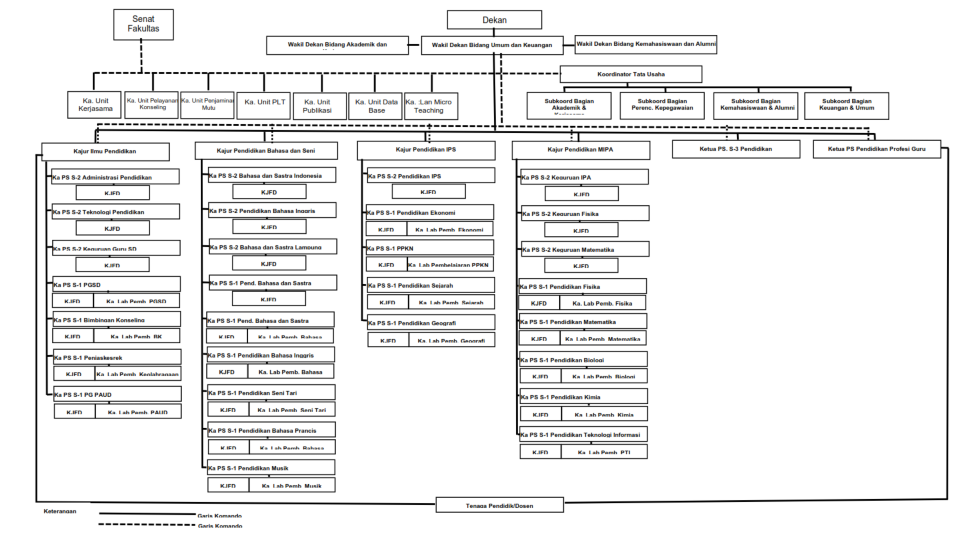The system and implementation of good governance at UPPS with a complete and functional organizational structure and governance, accompanied by clear main tasks and functions (tupoksi) for each, and fulfilling the five pillars: (1) credible, (2) transparent, (3) accountable, (4) responsible, and (5) fair.
The good governance system at FKIP Unila is regulated through a set of formal documents on governance and management, namely: the Unila Statute (Permenristekdikti RI Number 6 of 2015) and the Work Organization (Permendikbud RI SK No. 72 of 2014). The formal documents of the governance and management system have been elaborated in various regulations (http://jdih.unila.ac.id/) and based on the existing Statutes and OTK, FKIP Unila has established three organs, namely the Senate, the Dean, and the Faculty Quality Assurance Team as controllers of the implementation of UPPS, which has a complete structure in accordance with Peraturan Menteri Riset, Teknologi, dan Pendidikan Tinggi Republik Indonesia Nomor 6 Tahun 2015 tentang Statuta Universitas Lampung, Peraturan Menteri Pendidikan dan Kebudayaan Republik Indonesia Nomor 72 Tahun 2014 tentang Organisasi dan tata Kerja Universitas Lampung, dan Peraturan Rektor Universitas Lampung Nomor 12 Tahun 2021 tentang Organisasi dan Tata Kerja Fakultas. The organizational structure of the UPPS Unila [evidence] can be seen in Figure 2.

The principle of good governance at UPPS is reflected in the democratic selection process for faculty leadership, which follows several steps. Lecturers who are eligible to become faculty leaders must first fill out a statement of willingness to be nominated as faculty leaders, after which three dean candidates will be selected. The dean candidates then present their vision, mission, objectives, and work plans to be implemented in a faculty senate meeting. The election of the dean is carried out by the faculty senate, following the regulations and/or statutes of the university. After being elected, the dean then selects the vice dean through discussions in the senate meeting. The determination of the organizational functions (Tusi) at FKIP Unila has fulfilled five pillars: (1) credible, (2) transparent, (3) accountable, (4) responsible, and (5) fair. Credibility is demonstrated in the governance system at FKIP Unila, as evidenced by the implementation of every tridharma activity that refers to the existing quality standards (http://upm.fkip.unila.ac.id/standar-mutu/) and Standard Operating Procedures (http://upm.fkip.unila.ac.id/sop-tata-pamong/). One example of credible implementation is the selection, appointment, and assignment of the Chair and Secretary based on applicable regulations.
The Chair and Secretary of PSDP are elected in accordance with the Statutes of the University of Lampung. The Chair and Secretary of PSDP are elected from among the lecturers, the implementation of which is regulated by a decision of the Rector with the approval of the senate and is directly responsible to the dean. The appointment of the Chair (Rector’s Decree No. 1884/UN26/KP 2020) and the Secretary of the Study Program (Rector’s Decree No. 2100/UN26/KP 2022). The procedures for the election and implementation of the main duties of the Chair and Secretary of the PSDP are regulated in Permendikbud No. 72 of 2014 concerning the Organization and Work Procedures of the University of Lampung. Transparent governance at FKIP Unila is demonstrated by the availability of relevant information about program evaluation regulations that is open and easily accessible. Transparent accessibility in the management and selection of research grants and PkM through the silemlit system (https://silemlit21.unila.ac.id/); learning evaluation through Siakadu (https://siakadu.unila.ac.id/gate/login) and the Internal Quality Audit mechanism (AMI) (http://spm.unila.ac.id/); the existence of periodic reporting on funds managed by FKIP at the end of each year, such as the realization/report on the use of research and PkM grant funds, which can be accessed by interested parties.
Transparency in governance at PSDP is also marked by the openness of every policy taken by PS through leadership meetings. Accountable governance at FKIP Unila begins with program planning, program implementation, program monitoring and evaluation, which are accompanied by complete documentation of activities and the implementation of the three pillars of higher education. Accountability is demonstrated by submitting transparent and reasonable program performance accountability reports. The reporting system follows the reporting flow that has been established and agreed upon, including the items to be reported. The performance accountability of the study program leadership is realized through the obligation to submit periodic performance accountability reports to the faculty leadership through the Faculty Leadership Coordination Meeting (RKPF). The performance evaluation of PSDP lecturers is carried out at the end of each year in the form of Employee Performance Target (SKP) assessments and reports. The principles of good governance in UPPS are demonstrated through a democratic faculty leadership selection process, including through the implementation and planning of work programs to be carried out in faculty senate meetings. In this case, the dean candidates first present their vision, mission, objectives, and programs that can be developed to support the achievement of the UPPS vision, mission, and objectives. The dean is elected by the faculty senate, and the election mechanism is based on the Lampung University Statute. Next, the elected dean selects the vice dean, which is discussed in the senate meeting. Leadership at the department and study program levels is selected through a democratic process through a departmental lecturer meeting. The selection of the department chair/secretary, program chair, and laboratory chairs is carried out by the department lecturers based on the Lampung University Statutes. Other mechanisms are determined through faculty leadership meetings, such as the chair and secretary of the PPL, the Chair of the Database and Scientific Publication Unit, the Chair of the Integrated Counseling Service Unit, and the Chair of the Quality Assurance Unit.
